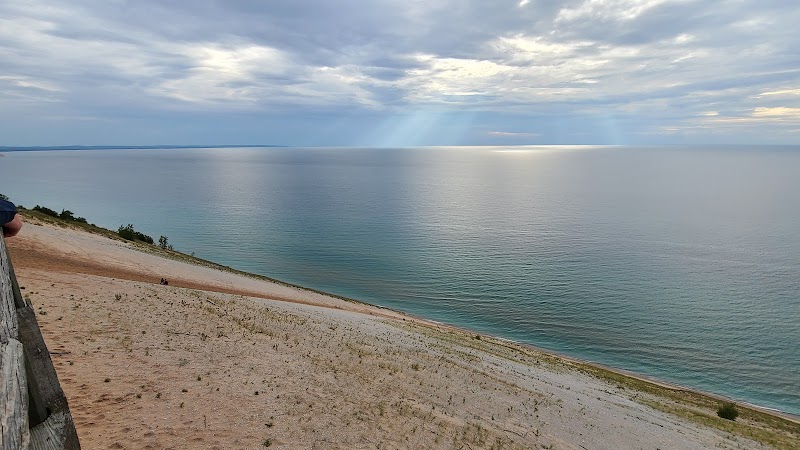
Ojibwe Festival in Cross Village: A Celebration Rooted in Culture and Nature
Experience the Ojibwe Festival in Cross Village, Michigan—a vibrant cultural celebration set against the striking backdrop of Lake Michigan’s northern shore. Discover indigenous traditions through music, dance, and food while exploring the nearby forested trails and lakeside views.
Wear Sturdy Footwear
The festival grounds contain uneven gravel paths and natural trails; comfortable shoes with good traction will keep you steady throughout the day.
Bring Water and Hydration
Water stations are available, but carry your own bottle to stay well-hydrated, especially during summer when temperatures can climb.
Layer Clothing
Mornings and evenings cool quickly near Lake Michigan, so a light jacket or fleece will keep you comfortable during early ceremonies or dusk events.
Arrive Early for Ceremonies
Some sacred events like the tobacco ceremony occur at dawn; arriving early offers a fuller, more intimate festival experience.
Ojibwe Festival in Cross Village: A Celebration Rooted in Culture and Nature
Each summer, Cross Village, Michigan, hums with the vibrant pulse of the Ojibwe Festival—an event that invites visitors into a living chapter of indigenous heritage tucked along the shores of Lake Michigan. The festival offers more than ceremonies; it is an engaging, hands-on experience where culture breathes in song, dance, and crafts. The air carries the scent of cedar and wild rice, while the nearby forests and waters stand as attentive witnesses to traditions fiercely upheld.
Cross Village itself is a quiet gateway, where the landscape shifts from dense pine forests to crystal-clear lake vistas. The festival spans several days and is timed to coincide with the thriving summer months, when the natural world is assertive and full of life. Attendees can expect a mix of storytelling sessions, traditional drumming, and authentic Ojibwe cuisine prepared on site.
The terrain around Cross Village is gentle but keeps you alert—gravel paths that trace forest edges, grassy clearings where community gatherings take place, and lakefront views that invite moments of quiet reflection. While the event is natural and outdoorsy, it’s wise to come prepared: sturdy footwear is essential for uneven ground, and layers help adjust to the shifting temperatures, especially as the sun sets over Lake Michigan.
Hydration is key—water stations available at the site encourage visitors to stay refreshed under the July sun. Timing your arrival for morning or late afternoon helps avoid peak heat and catch the festival’s most immersive moments, such as the sunrise tobacco ceremony and the evening pow wow.
The Ojibwe Festival is more than an event; it’s an encounter with a community fiercely protective of its identity and environment. The trees here seem to lean in, the lake’s waves push gently to the shore, and every breath you take feels grounded in a landscape as alive with history as it is with present joy. To participate is to respect, to listen, and to experience a rare cultural immersion framed by the gentle power of Michigan’s northern woods and waters.
Nearby Trips
All Adventures
Boat Charters
Water Activities
Adventures near Cross Village, Michigan
Discover the unique and memorable adventures that make Cross Village, Michigan special.
Frequently Asked Questions
What are some unique activities to expect at the Ojibwe Festival?
The festival features traditional drum circles, storytelling sessions that share heritage and legends, and communal wild rice harvesting demonstrations that highlight the Ojibwe’s deep connection to the land.
Is the festival suitable for children and families?
Yes, the event welcomes families with interactive workshops and kid-friendly cultural presentations that teach respect for nature and indigenous practices.
Are there any special environmental considerations for visitors?
Visitors are encouraged to respect the land by staying on designated paths, avoiding single-use plastics, and participating in leave-no-trace principles to protect the natural and cultural site.
Can I purchase Ojibwe crafts or food at the festival?
Yes, artisans and food vendors offer handmade crafts, beadwork, and traditional foods such as fry bread and wild rice dishes, connecting visitors directly to Ojibwe craftsmanship and culinary heritage.
Where is the best spot to experience the sunset during the festival?
The lakeshore near the festival provides clear western views, where the sun dips into Lake Michigan, offering spectacular color shows that complement the evening powwow dances perfectly.
Is parking available near the festival grounds?
There is limited parking in Cross Village village center, so early arrival is recommended. Some shuttle services run from nearby Petoskey during peak festival days.
Recommended Gear
Comfortable Hiking Shoes
Supportive shoes with grip to handle gravel paths and natural surfaces at the festival site.
Water Bottle
Keeps you hydrated during long days in the sun and warm weather.
Light Jacket or Fleece
Useful for cooler mornings and evenings by the lake.
Sun Protection
Hat, sunglasses, and sunscreen protect against strong sun exposure near Lake Michigan.
Local Insights
Hidden Gems
- "The quiet beach west of the main village provides unobstructed views of the changing seasons over Lake Michigan."
- "A lesser-known trail loops through a nearby cedar swamp where the air holds a distinct herbal aroma important to Ojibwe ceremonies."
Wildlife
- "Keep an eye out for white-tailed deer grazing near the forest edges and the occasional red-tailed hawk circling overhead."
- "In the lake’s shallows, native freshwater fish such as smallmouth bass dart among submerged rocks."
History
"Cross Village is historically significant as a longstanding presence of the Ojibwe people, serving as both a seasonal gathering site and a cultural hub where oral traditions and community activities have been preserved over generations."
